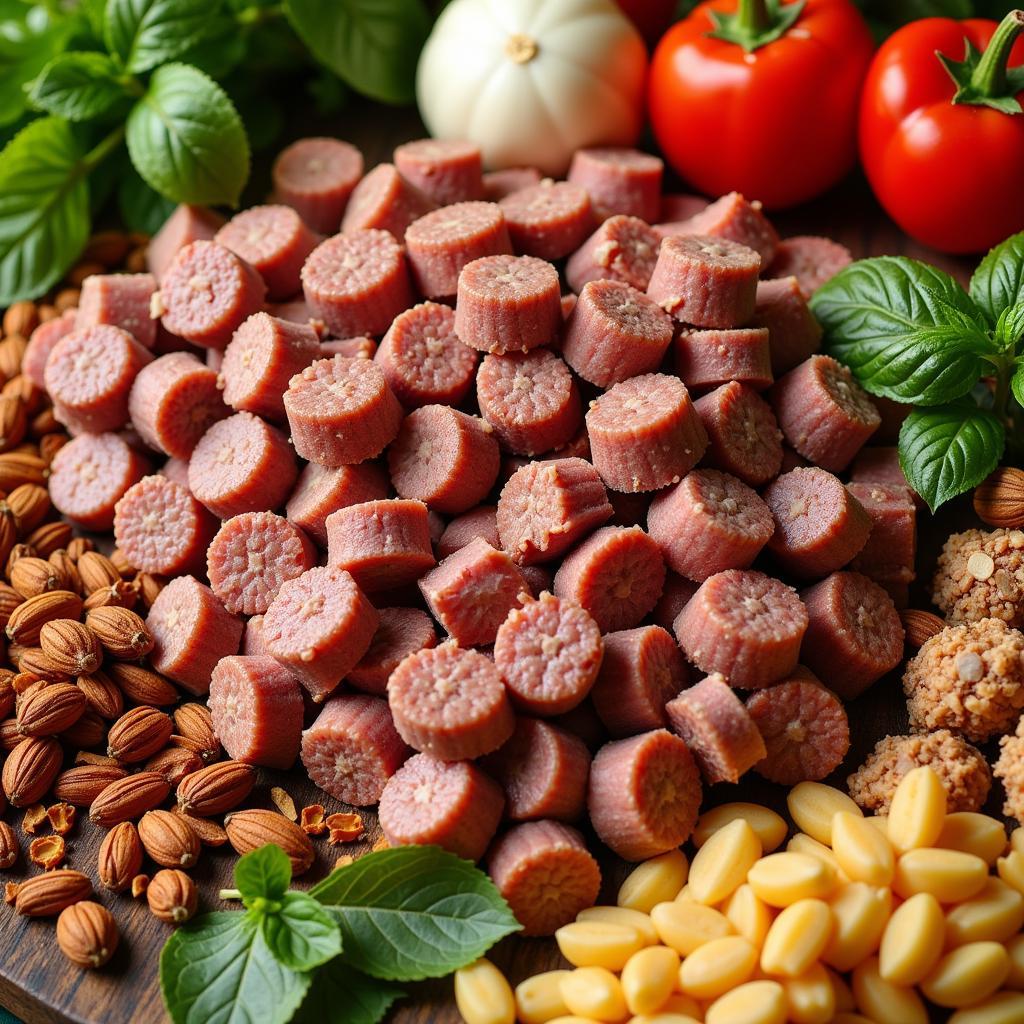Choosing the Best St Bernard Puppy Food is crucial for raising a healthy, happy giant. These lovable dogs grow rapidly, and proper nutrition during puppyhood sets the stage for a long, active life. From selecting the right ingredients to understanding portion control, we’ll explore everything you need to know about nourishing your St. Bernard puppy.
Understanding Your St. Bernard Puppy’s Nutritional Needs
St. Bernards aren’t just big; they’re giants of the canine world. This rapid growth puts unique demands on their bodies, requiring a diet rich in specific nutrients. Protein is essential for muscle development, while calcium and phosphorus support strong bones. Look for puppy foods specifically formulated for large breeds, as these contain the correct balance of nutrients to prevent developmental issues like hip dysplasia, a common concern in large breed dogs.
Proper nutrition also plays a vital role in supporting a St. Bernard puppy’s immune system. A balanced diet with antioxidants and essential vitamins helps protect against illness and builds a strong foundation for lifelong health.
 St. Bernard puppy enjoying a healthy meal
St. Bernard puppy enjoying a healthy meal
Choosing the Right Type of Food
When navigating the pet food aisle, you’ll encounter various types of puppy food, including dry kibble, wet food, and raw diets. Dry kibble is often the most popular choice due to its affordability, convenience, and dental benefits. The crunchy texture helps scrape away plaque, promoting good oral hygiene. Wet food can be a tempting option for picky eaters, but it’s generally more expensive and less beneficial for dental health. Raw diets require careful preparation and balancing of nutrients, and it’s essential to consult with a veterinarian before embarking on a raw feeding regimen for your St. Bernard puppy.
Key Ingredients to Look For
Deciphering pet food labels can feel like reading a foreign language, but understanding key ingredients is crucial. Look for high-quality protein sources, such as chicken, beef, lamb, or fish, listed as the first ingredients. Avoid foods with fillers like corn, wheat, and soy, as these offer little nutritional value and can cause digestive upset in some dogs. Healthy fats, like those from fish oil, are essential for brain development and coat health. Additionally, look for foods that include glucosamine and chondroitin, which support joint health, especially important for large breeds like St. Bernards.
 Close-up of high-quality dog food ingredients
Close-up of high-quality dog food ingredients
How Much Should I Feed My St. Bernard Puppy?
Determining the correct portion size is key to preventing overfeeding and obesity, a significant risk for St. Bernards. Follow the feeding guidelines on the puppy food packaging as a starting point, but remember to adjust the amount based on your puppy’s individual needs and activity level. Monitor your puppy’s weight and body condition, and consult your veterinarian for personalized feeding recommendations.
Feeding Schedule and Transitioning to New Food
Establishing a regular feeding schedule helps regulate your puppy’s digestion and prevents begging. Divide your puppy’s daily food allowance into two or three meals, and avoid free-feeding. When transitioning to a new food, gradually introduce it over several days to avoid digestive upset. Start by mixing a small amount of the new food with the old food, gradually increasing the proportion of new food until the transition is complete.
 St. Bernard puppy eating on a schedule
St. Bernard puppy eating on a schedule
Best St. Bernard Puppy Food: Making the Right Choice
Choosing the best food for your St. Bernard puppy is a significant decision. Prioritize quality ingredients, appropriate nutrient levels for large breed puppies, and consult with your veterinarian for personalized guidance.
Dr. Emily Carter, DVM, specializing in large breed canine nutrition, advises, “A high-quality diet tailored to their unique growth needs is an investment in your St. Bernard’s long-term health and well-being.” She further emphasizes, “Regular veterinary checkups and monitoring your puppy’s growth and body condition are crucial for ensuring they’re thriving on their chosen diet.”
In conclusion, selecting the best St Bernard puppy food is a crucial step in ensuring your gentle giant grows into a healthy and happy adult. By focusing on a balanced diet with high-quality ingredients and appropriate portion control, you’re setting your St. Bernard puppy up for a long and active life.
FAQ
- What is the best food for St. Bernard puppies? – Large breed puppy food with high-quality protein and joint support.
- How much should I feed my St. Bernard puppy? – Follow package guidelines, adjust based on individual needs, and consult your vet.
- Can I feed my St. Bernard puppy raw food? – Consult your vet for guidance on raw feeding.
- What are signs of a good quality puppy food? – High-quality protein sources listed first, limited fillers, and added joint support.
- How often should I feed my St. Bernard puppy? – Divide daily food into 2-3 meals.
- What should I do if my St. Bernard puppy is a picky eater? – Try different flavors or textures, consult your vet for advice.
7.. How do I transition my St. Bernard puppy to a new food? Gradually introduce it over several days by mixing it with the old food.
Please contact us for further assistance: Phone: 02437655121, Email: minacones@gmail.com Or visit us at: 3PGH+8R9, ĐT70A, thôn Trung, Bắc Từ Liêm, Hà Nội, Việt Nam. We have a 24/7 customer support team.